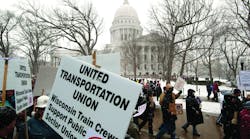Editorial: Time for Labor To Sacrifice MTA Unions Must do Fair Share
Source The New York Post
It's a new day at the Metropolitan Transportation Authority. We're leaner.
Aggressive cost-cutting has paid off with better performance and increased efficiency in America's largest and most reliable mass-transit network. But non-discretionary expenses and labor costs threaten to cripple the MTA - and our region's economy along with it.
It's not yet common knowledge, but the agency is in an era of cost-containment and -control unlike anything in its history - as even a quick glance at the MTA's financial statement reveals.
Annual expense reductions in the operating budget - that is, savings that recur year after year - totaled about $700 million in 2011 and will grow to $890 million in 2015. That's 11 percent of our discretionary operating budget.
How did we do it? We eliminated more than 3,500 positions, including 20 percent of our headquarters staff. We renegotiated vendor contracts. We froze wages for all non-union employees. We rebid employee health care. We reduced unnecessary overtime and consolidated redundant functions.
The list goes on and on . . . and this work is far from over. In 2012 and beyond, we'll continue to slash costs while looking for creative ways to bring in revenue.
We reduced office-lease space by 15 percent, and will cut our facilities costs further when we unload our Madison Avenue headquarters. We'll consolidate more administrative and operating functions. We're refinancing our outstanding debt. We're exploring the sale of air rights. And we're doing it all without cutting service or inconveniencing our customers.
Bottom line: We're doing everything we can to hold the line on expenses we can control, and we're seeing results.
Over the last year, during a period of 2.8 percent inflation, the MTA's discretionary costs of $6.3 billion have increased only 0.6 percent. They're forecast to rise just 1.8 percent from 2010 to 2015, significantly below the rate of inflation.
But nondiscretionary costs, which totaled $5.2 billion in 2011, are another story entirely. Over that same 2010-to-2015 period, our health-care costs are forecast to jump 9.5 percent. Pension costs rise 6.9 percent. Energy costs go up 9.7 percent. And debt service is projected to increase 7.5 percent.
If left unchecked, these nondiscretionary costs will be more than $2 billion higher by 2015.
All the while - during a time of unprecedented cost-cutting at the MTA, and as our nondiscretionary costs spiral out of control - binding arbitration has required that members of our largest labor union get pay hikes of 4 percent in 2009, 4 percent in 2010 and 3 percent in 2011.
That's a whopping 11 percent over the last three years, at a time when New York City's cost-of-living index rose 4.6 percent.
Managers and non-union workers haven't been so lucky. They got 0 percent in 2009, 0 percent in 2010 and 0 percent in 2011. Today, these public servants have gone four years without so much as a cost-of-living increase.
That's why the MTA is asking its unionized workforce, during its current contract talks, to forego raises for the next three years.
In these tough financial times, getting the MTA onto sound financial footing requires sacrifices from everyone involved in safely moving 8.5 million people every day - 24 hours a day, seven days a week.
As it stands now, our customers have given: They've endured fare and toll hikes and service cuts needed to close deficits.
Local businesses have given, through the Payroll Mobility Tax, to the tune of more than $1.2 billion a year.
The MTA has given: We're on track to achieve cumulative operating expense savings of $3.8 billion by 2014.
Our managers and non-union employees have given: Their salaries are stuck in 2008.
Now it's time for labor to be part of the solution.
Joseph J. Lhota is chairman and CEO of the MTA.
Copyright 2008 LexisNexis, a division of Reed Elsevier Inc. All rights reserved.
Terms and Conditions | Privacy Policy



